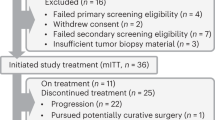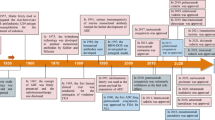Abstract
Gene therapy is being examined as a potential strategy for treating prostate cancer. Serotype 5 adenovirus (Ad.5) is routinely used as a vector for transgene delivery. However, the infectivity of Ad.5 is dependent on Coxsackie-adenovirus receptors (CARs); many tumor types show a reduction in this receptor in vivo, thereby limiting therapeutic gene transduction. Serotype chimerism is one approach to circumvent CAR deficiency; this strategy is used to generate an Ad.5/3-recombinant Ad that infects cancer cells through Ad.3 receptors in a CAR-independent manner. In this report, the enhanced transgene delivery and efficacy of Ad.5/3-recombinant virus was evaluated using an effective wide-spectrum anticancer therapeutic melanoma differentiation-associated gene-7/interleukin-24 (mda-7/IL-24). Our data show that in low CAR human prostate cancer cells (PC-3), a recombinant Ad.5/3 virus delivering mda-7/IL-24 (Ad.5/3-mda-7) is more efficacious than an Ad.5 virus encoding mda-7/IL-24 (Ad.5-mda-7) in infecting tumor cells, expressing MDA-7/IL-24 protein, inducing cancer-specific apoptosis, inhibiting in vivo tumor growth and exerting an antitumor ‘bystander’ effect in a nude mouse xenograft model. Considering the fact that Ad.5-mda-7 has shown significant objective responses in a phase I clinical trial for solid tumors, Ad.5/3-mda-7 is predicted to exert enhanced therapeutic benefit in patients with prostate cancer.
This is a preview of subscription content, access via your institution
Access options
Subscribe to this journal
Receive 12 print issues and online access
$259.00 per year
only $21.58 per issue
Buy this article
- Purchase on Springer Link
- Instant access to full article PDF
Prices may be subject to local taxes which are calculated during checkout





Similar content being viewed by others
References
Damber JE, Aus G . Prostate cancer. Lancet 2008; 371: 1710–1721.
Sternberg CN . Highlights of contemporary issues in the medical management of prostate cancer. Crit Rev Oncol Hematol 2002; 43: 105–121.
Di Lorenzo G, De Placido S . Hormone refractory prostate cancer (HRPC): present and future approaches of therapy. Int J Immunopathol Pharmacol 2006; 19: 11–34.
Mabjeesh NJ, Zhong H, Simons JW . Gene therapy of prostate cancer: current and future directions. Endocr Relat Cancer 2002; 9: 115–139.
Glasgow JN, Bauerschmitz GJ, Curiel DT, Hemminki A . Transductional and transcriptional targeting of adenovirus for clinical applications. Curr Gene Ther 2004; 4: 1–14.
Paul CP, Everts M, Glasgow JN, Dent P, Fisher PB, Ulasov IV et al. Characterization of infectivity of knob-modified adenoviral vectors in glioma. Cancer Biol Ther 2008; 7: 786–793.
Tsuruta Y, Pereboeva L, Glasgow JN, Rein DT, Kawakami Y, Alvarez RD et al. A mosaic fiber adenovirus serotype 5 vector containing reovirus sigma 1 and adenovirus serotype 3 knob fibers increases transduction in an ovarian cancer ex vivo system via a Coxsackie and adenovirus receptor-independent pathway. Clin Cancer Res 2007; 13: 2777–2783.
Waehler R, Russell SJ, Curiel DT . Engineering targeted viral vectors for gene therapy. Nat Rev Genet 2007; 8: 573–587.
Mathis JM, Stewart PL, Zhu ZB, Curiel DT . Advanced generation adenoviral virotherapy agents embody enhanced potency based upon CAR-independent tropism. Clin Cancer Res 2006; 12: 2651–2656.
Jiang H, Lin JJ, Su ZZ, Goldstein NI, Fisher PB . Subtraction hybridization identifies a novel melanoma differentiation associated gene, mda-7, modulated during human melanoma differentiation, growth and progression. Oncogene 1995; 11: 2477–2486.
Jiang H, Su ZZ, Lin JJ, Goldstein NI, Young CSH, Fisher PB . The melanoma differentiation associated gene mda-7 suppresses cancer cell growth. Proc Natl Acad Sci USA 1996; 93: 9160–9165.
Huang EY, Madireddi MT, Gopalkrishnan RV, Leszczyniecka M, Su Z, Lebedeva IV et al. Genomic structure, chromosomal localization and expression profile of a novel melanoma differentiation associated (mda-7) gene with cancer specific growth suppressing and apoptosis inducing properties. Oncogene 2001; 20: 7051–7063.
Parrish-Novak J, Xu W, Brender T, Yao L, Jones C, West J et al. Interleukins 19, 20, and 24 signal through two distinct receptor complexes. Differences in receptor-ligand interactions mediate unique biological functions. J Biol Chem 2002; 277: 47517–47523.
Caudell EG, Mumm JB, Poindexter N, Ekmekcioglu S, Mhashilkar AM, Yang XH et al. The protein product of the tumor suppressor gene, melanoma differentiation-associated gene 7, exhibits immunostimulatory activity and is designated IL-24. J Immunol 2002; 168: 6041–6046.
Pestka S, Krause CD, Sarkar D, Walter MR, Shi Y, Fisher PB . Interleukin-10 and related cytokines and receptors. Annu Rev Immunol 2004; 22: 929–979.
Gupta P, Su ZZ, Lebedeva IV, Sarkar D, Sauane M, Emdad L et al. mda-7/IL-24: multifunctional cancer-specific apoptosis-inducing cytokine. Pharmacol Ther 2006; 111: 596–628.
Fisher PB . Is mda-7/IL-24 a ‘magic bullet’ for cancer? Cancer Res 2005; 65: 10128–10138.
Emdad L, Lebedeva IV, Su ZZ, Gupta P, Sauane M, Dash R et al. Historical perspective and recent insights into our understanding of the molecular and biochemical basis of the antitumor properties of mda-7/IL-24. Cancer Biol Ther 2009; 8: 391–400.
Su ZZ, Lebedeva IV, Gopalkrishnan RV, Goldstein NI, Stein CA, Reed JC et al. A combinatorial approach for selectively inducing programmed cell death in human pancreatic cancer cells. Proc Natl Acad Sci USA 2001; 98: 10332–10337.
Su ZZ, Madireddi MT, Lin JJ, Young CS, Kitada S, Reed JC et al. The cancer growth suppressor gene mda-7 selectively induces apoptosis in human breast cancer cells and inhibits tumor growth in nude mice. Proc Natl Acad Sci USA 1998; 95: 14400–14405.
Cunningham CC, Chada S, Merritt JA, Tong A, Senzer N, Zhang et al. Clinical and local biological effects of an intratumoral injection of mda-7 (IL24; INGN 241) in patients with advanced carcinoma: a phase I study. Mol Ther 2005; 11: 149–159.
Tong AW, Nemunaitis J, Su D, Zhang Y, Cunningham C, Senzer N et al. Intratumoral injection of INGN 241, a nonreplicating adenovector expressing the melanoma-differentiation associated gene-7 (mda-7/IL24): biologic outcome in advanced cancer patients. Mol Ther 2005; 11: 160–172.
Ramesh R, Mhashilkar AM, Tanaka F, Saito Y, Branch CD, Sieger K et al. Melanoma differentiation-associated gene 7/interleukin (IL)-24 is a novel ligand that regulates angiogenesis via the IL-22 receptor. Cancer Res 2003; 63: 5105–5113.
Su Z-z, Emdad L, Sauane M, Lebedeva IV, Sarkar D, Gupta P et al. Unique aspects of mda-7/IL-24 antitumor bystander activity: establishing a role for secretion of MDA-7/IL-24 protein by normal cells. Oncogene 2005; 24: 7552–7566.
Lebedeva IV, Sarkar D, Su Z-z, Kitada S, Dent P, Stein CA et al. Bcl-2 and Bcl-xL differentially protect human prostate cancer cells from induction of apoptosis by melanoma differentiation associated gene-7, mda-7/IL-24. Oncogene 2003; 22: 8758–8773.
Lebedeva IV, Su Z-z, Chang Y, Kitada S, Reed JC, Fisher PB . The cancer growth suppressing gene mda-7 induces apoptosis selectively in human melanoma cells. Oncogene 2002; 21: 708–718.
Sarkar D, Su Z-z, Vozhilla N, Park ES, Gupta P, Fisher PB . Dual cancer-specific targeting strategy cures primary and distant breast carcinomas in nude mice. Proc Natl Acad Sci USA 2005; 102: 14034–14039.
Sarkar D, Su Z-z, Vozhilla N, Park ES, Randolph A, Valerie K et al. Targeted virus replication plus immunotherapy eradicates primary and distant pancreatic tumors in nude mice. Cancer Res 2005; 65: 9056–9063.
Jemal A, Siegel R, Ward E, Hao Y, Xu J, Murray T et al. Cancer statistics. CA Cancer J Clin 2008; 58: 71–96.
Cookson MM . Prostate cancer: screening and early detection. Cancer Control 2001; 8: 133–140.
Eisenberger MA, Walsh PC . Early androgen deprivation for prostate cancer? N Engl J Med 1999; 341: 1837–1838.
Gopalkrishnan RV, Kang DC, Fisher PB . Molecular markers and determinants of prostate cancer metastasis. J Cell Physiol 2001; 189: 245–256.
Anderson W . Human gene therapy. Nature 1998; 392: 25–30.
Pandha HS, Stockwin LH, Eaton J, Clarke IA, Dalgleish AG, Todryk SM et al. Coxsackie B and adenovirus receptor, integrin and major histocompatibility complex class I expression in human prostate cancer cell lines: implications for gene therapy strategies. Prostate Cancer Prostatic Dis 2003; 6: 6–11.
Okegawa T, Li Y, Pong RC, Bergelson JM, Zhou J, Hsieh JT . The dual impact of Coxsackie and adenovirus receptor expression on human prostate cancer gene therapy. Cancer Res 2000; 60: 5031–5036.
VanOosten RL, Earel Jr JK, Griffith TS . Enhancement of Ad.5-TRAIL cytotoxicity against renal cell carcinoma with histone deacetylase inhibitors. Cancer Gene Ther 2006; 13: 628–632.
VanOosten RL, Earel Jr JK, Griffith TS . Histone deacetylase inhibitors enhance Ad.5-TRAIL killing of TRAIL-resistant prostate tumor cells through increased caspase-2 activity. Apoptosis 2007; 12: 561–571.
Ulasov IV, Tyler MA, Zheng S, Han Y, Lesniak MS . CD46 represents a target for adenoviral gene therapy of malignant glioma. Hum Gene Ther 2006; 17: 556–564.
Ulasov IV, Rivera AA, Han Y, Curiel DT, Zhu ZB, Lesniak MS . Targeting adenovirus to CD80 and CD86 receptors increases gene transfer efficiency to malignant glioma cells. J Neurosurg 2007; 107: 617–627.
Anderson BD, Nakamura T, Russell SJ, Peng KW . High CD46 receptor density determines preferential killing of tumor cells by oncolytic measles virus. Cancer Res 2004; 64: 4919–4926.
Kanerva A, Mikheeva GV, Krasnykh V, Coolidge CJ, Lam JT, Mahasreshti PJ et al. Targeting adenovirus to the serotype 3 receptor increases gene transfer efficiency to ovarian cancer cells. Clin Cancer Res 2002; 8: 275–280.
Haviv YS, Blackwell JL, Kanerva A, Nagi P, Krasnykh V, Dmitriev I et al. Adenoviral gene therapy for renal cancer requires retargeting to alternative cellular receptors. Cancer Res 2002; 62: 4273–4281.
Volk AL, Rivera AA, Kanerva A, Bauerschmitz G, Dmitriev I, Nettelbeck DM et al. Enhanced adenovirus infection of melanoma cells by fiber-modification: incorporation of RGD peptide or Ad.5/3 chimerism. Cancer Biol Ther 2003; 2: 511–515.
Koizumi N, Yamaguchi T, Kawabata K, Sakurai FTS, Watanabe Y, Hayakawa T et al. Fiber-modified adenovirus vectors decrease liver toxicity through reduced interleukin 6 production. J. Immunol 2007; 178: 1767–1773.
Howard CM, Forsberg F, Minimo C, Liu JB, Merton DA, Claudio PP . Ultrasound guided site-specific gene delivery system using adenoviral vectors and commercial ultrasound contrast agents. J Cell Physiol 2006; 209: 413–421.
Miyahara R, Banerjee S, Kawano K, Efferson C, Tsuda N, Miyahara Y et al. Melanoma differentiation-associated gene-7 (mda-7)/interleukin (IL)-24 induces anticancer immunity in a syngeneic murine model. Cancer Gene Ther 2006; 13: 753–761.
Ellwood-Yen K, Graeber TG, Wongvipat J, Iruela-Arispe ML, Zhang J, Matusik R et al. Myc-driven murine prostate cancer shares molecular features with human prostate tumors. Cancer Cell 2003; 4: 223–238.
Acknowledgements
This study was supported in part by NIH Grants P01 CA104177 and CA097318, the National Foundation for Cancer Research (NFCR), the Samuel Waxman Cancer Research Foundation, the Goldhirsh Foundation and the Dana Foundation. DS is the Harrison Endowed Scholar in the VCU Massey Cancer Center. PBF holds the Thelma Newmeyer Corman Chair in Cancer Research at the VCU Massey Cancer Center and is a SWCRF Investigator.
Author information
Authors and Affiliations
Corresponding author
Ethics declarations
Competing interests
The authors declare no conflict if interest.
Rights and permissions
About this article
Cite this article
Dash, R., Dmitriev, I., Su, Zz. et al. Enhanced delivery of mda-7/IL-24 using a serotype chimeric adenovirus (Ad.5/3) improves therapeutic efficacy in low CAR prostate cancer cells. Cancer Gene Ther 17, 447–456 (2010). https://doi.org/10.1038/cgt.2009.91
Received:
Revised:
Accepted:
Published:
Issue Date:
DOI: https://doi.org/10.1038/cgt.2009.91
Keywords
This article is cited by
-
sIL-24 peptide, a human interleukin-24 isoform, induces mitochondrial-mediated apoptosis in human cancer cells
Cancer Chemotherapy and Pharmacology (2017)
-
Combinatorial strategies based on CRAd-IL24 and CRAd-ING4 virotherapy with anti-angiogenesis treatment for ovarian cancer
Journal of Ovarian Research (2016)
-
BI-69A11 enhances susceptibility of colon cancer cells to mda-7/IL-24-induced growth inhibition by targeting Akt
British Journal of Cancer (2014)
-
Gene therapy in India: A focus
Journal of Biosciences (2014)
-
Micellar Delivery of Flutamide Via Milk Protein Nanovehicles Enhances its Anti-Tumor Efficacy in Androgen-Dependent Prostate Cancer Rat Model
Pharmaceutical Research (2013)



